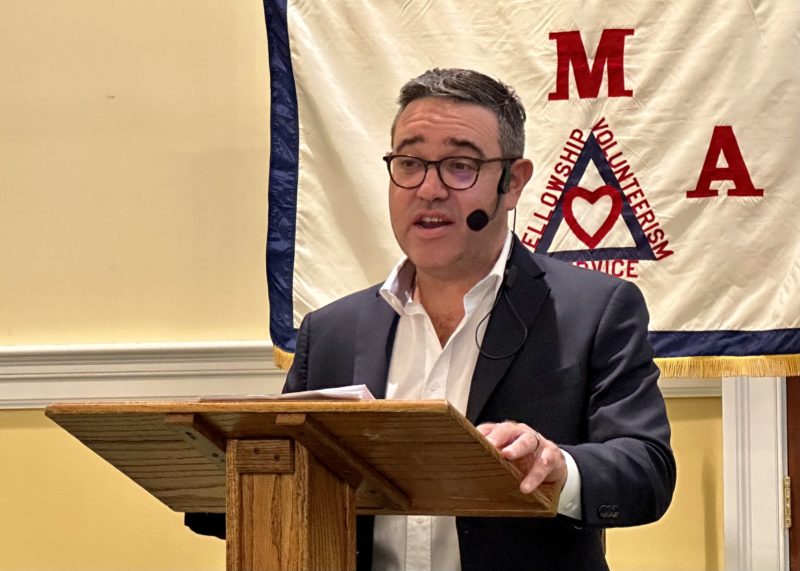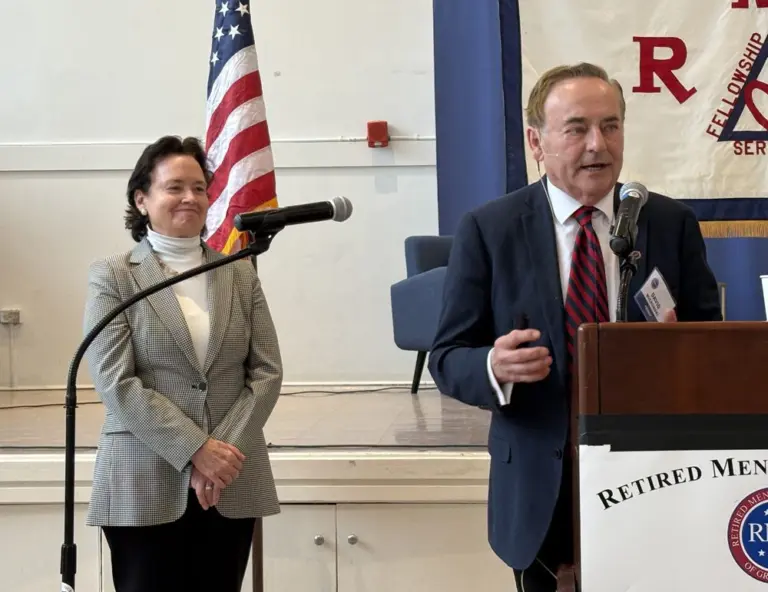
By Arnold Gordon
At the August 14 meeting of the Retired Men’s Association Larry Allen introduced Daniel Schulman, who discussed his latest book, “The Money Kings: The Epic Story of the Jewish Immigrants Who Transformed Wall Street and Shaped Modern America.” Larry said that it was a masterpiece and one of his favorite books.
Daniel is a New York Times best-selling author and journalist whose work has appeared in publications including the Atlantic, Boston Globe Magazine, The Los Angeles Times, Politico, Vanity Fair, The Washington Post, and Mother Jones, where he is the magazine’s deputy editor overseeing news and political coverage. He is the author of “Sons of Wichita,” a biography of the Koch brothers.
“The Money Kings” delves into the lives and legacies of influential immigrant German Jewish bankers who played pivotal roles in shaping modern American history. These figures, including the founders of Goldman Sachs, Lehman Brothers, J. & W. Seligman and Company, and Jacob Schiff of Kuhn Loeb, were instrumental in the development of Wall Street and our modern economic system. His research for the book spanned a decade, taking him to various locations across the globe, including the German State Department in Berlin, the Rothschild Archive in London, and even Norman, Oklahoma, where he discovered ledgers of J. & W. Seligman Company.
One of the most intriguing places he visited was Salem Fields Cemetery, straddling Brooklyn and Queens. It was established 175 years ago by Temple Emanuel in New York City and is adorned with grand mausoleums housing the remains of members of prominent families like Guggenheim, Seligman, Bloomingdale, Goldman, Sachs, and Lehman. High on a hillside, overlooking many others, stands the mausoleum of Jacob Schiff, resembling something one might find on Mount Olympus.
Jacob Schiff emerges as a central figure in Schulman’s book. Although not well-remembered today, Schiff was a colossus of finance and Jewish life in his time. As the head of the investment bank Kuhn Loeb, he rivaled J.P. Morgan in terms of influence and importance in the financial world. Schiff was the unelected but undisputed leader of American Jewry, internationally renowned. He presided over an era of philanthropy unparalleled in modern American history. He was able to bridge two worlds, the opulent and rarefied world of the German Jewish elite and the often-impoverished world of immigrants from Russia and Eastern Europe. Such was his fame that on the day of his funeral in 1920, the streets of the Lower East Side were eerily quiet, with businesses closed and placards in windows mourning his loss. Hundreds of condolence telegrams poured in from dignitaries and world leaders, including President Woodrow Wilson, who lamented the loss of one of the nation’s “most useful citizens.” The funeral service at Temple Emanuel was attended by a who’s who of American society, including railroad presidents, ambassadors, mining magnates, and prominent publishers. At the funeral procession down Fifth Avenue thousands of people, many of them poor immigrants, gathered to pay their respects.
Schulman’s book includes the stories of other remarkable German Jewish families who formed a business, social, and philanthropic circle. These include the founding families of Goldman Sachs, Lehman Brothers, Kuhn Loeb, and J. & W. Seligman and Company. The author provides fascinating details about these families, such as the Lehman brothers’ humble beginnings as peddlers in Alabama before they entered the cotton commodities business and grew their empire. The title “Money Kings” comes from a term used in the Gilded Age to describe the biggest tycoons of the era, not exclusively Jewish bankers. Schulman explains that he chose this title to acknowledge their accomplishments irrespective of religion, emphasizing that their stories are central to American and world history, not just Jewish history. They all were major philanthropists with their support of schools, anti-poverty programs, and many other causes. Schulman grappled with the decision to write the book, considering the potential for anti-Semitic interpretations. However, he ultimately decided it was important to tell this story in an unvarnished way. He pointed out that Henry Ford, through his publication The Dearborn Independent, disseminated articles of lies and conspiracy theories for over seven years, and was the instigator of modern antisemitism.
The historical impact of these bankers was profound and far-reaching. They helped create the Federal Reserve and the progressive income tax, advised presidential administrations on financial and foreign policy, and shaped the very demographics of the United States. As the Jewish population grew from 400,000 in 1890 to 3.4 million in 1920, their influence made it possible for the new immigrants to come to America and thrive, fundamentally altering the nation’s cultural and economic landscape.
Throughout the book, Schulman strives to present a balanced and comprehensive view of these influential figures. He acknowledges their tremendous achievements and contributions to American society while also exploring the complexities and controversies surrounding their roles. By doing so, he aims to situate Schiff and his allies as not just some of the most important actors in modern Jewish history, but in American history itself.
“The Money Kings” offers a nuanced and detailed exploration of a crucial period in American financial and cultural history. By focusing on these German Jewish bankers, Schulman illuminates the intricate connections between finance, immigration, philanthropy, and the development of modern America. The book serves as a reminder of the significant contributions of Jewish Americans to the nation’s growth and prosperity, while also providing insight into the origins of certain anti-Semitic myths and conspiracy theories.
The talk can be viewed by going to the RMA website at https://greenwichrma.org, and clicking on “Speakers.”
The RMA’s upcoming presentation, “Getting Out of Saigon,” by Ralph White, is scheduled for 11 AM on Wednesday, August 28, 2024. The RMA will present the captivating true story of author Ralph White’s successful effort to save nearly the entire staff of the Saigon branch of Chase Manhattan Bank and their families before the city fell to the North Vietnamese Army. In April 1975, White was asked by his boss to transfer from the Bangkok branch of the bank to the Saigon branch. He was tasked with closing the branch if and when it appeared that Saigon would fall to the North Vietnamese army and ensure the safety of the senior Vietnamese employees.
But when he arrived, he realized the situation in Saigon was far more perilous than he had imagined. Senior staff members there urged him to evacuate the entire staff and their families, which was far more than he was authorized to do. Quickly he realized that no one would be safe when the city fell, and it was no longer a question of whether to evacuate but how.
“Getting Out of Saigon” is an edge-of-your-seat story of a city on the eve of destruction and the colorful characters who responded differently to impending doom. It’s a remarkable account of one man’s quest to save innocent lives.
During Ralph White’s career in corporate finance, spanning the 70s, 80s, and 90s, he worked for American Express, the Chase Manhattan Bank, and Sumitomo Bank. His assignments included Vietnam, Thailand, Hong Kong, Japan, and New York. He is a graduate of Columbia University’s School of Business Administration. After 9/11 Ralph traded his corporate finance career for public service and writing. He founded and, for ten years, served as the president of the Columbia Fiction Foundry, a writing workshop for alumni of Columbia University. He is the author of “Getting Out of Saigon, How a 27 Year Old Banker Saved 113 Vietnamese Civilians, “and also “Litchfield,” a local history of his hometown, Litchfield, CT.
To stream the presentation by Ralph White at 11 AM on Wednesday, August 28, click on https://bit.ly/30IBj21. This presentation will also be available on local public access TV channels, Verizon FIOS channel 24 and Optimum (Cablevision) channel 79. The public is also invited to attend the presentation in person at the First Presbyterian Church of Greenwich at 1 West Putnam Avenue.
Note: The views expressed in these presentations are those of the speakers. They are not intended to represent the views of the RMA or its members.
RMA speaker presentations are presented as a community service at no cost to in-person or Zoom attendees, regardless of gender. Any member of the public who would like to receive a weekly email announcement of future speakers should send a request to members@greenwichrma.org. The RMA urges all eligible individuals to consider becoming a member of our great organization, and thereby enjoy all the available fellowship, volunteer, and community service opportunities which the RMA offers to its members. For further information, go to https://greenwichrma.org/, or contact members@greenwichrma.org.



